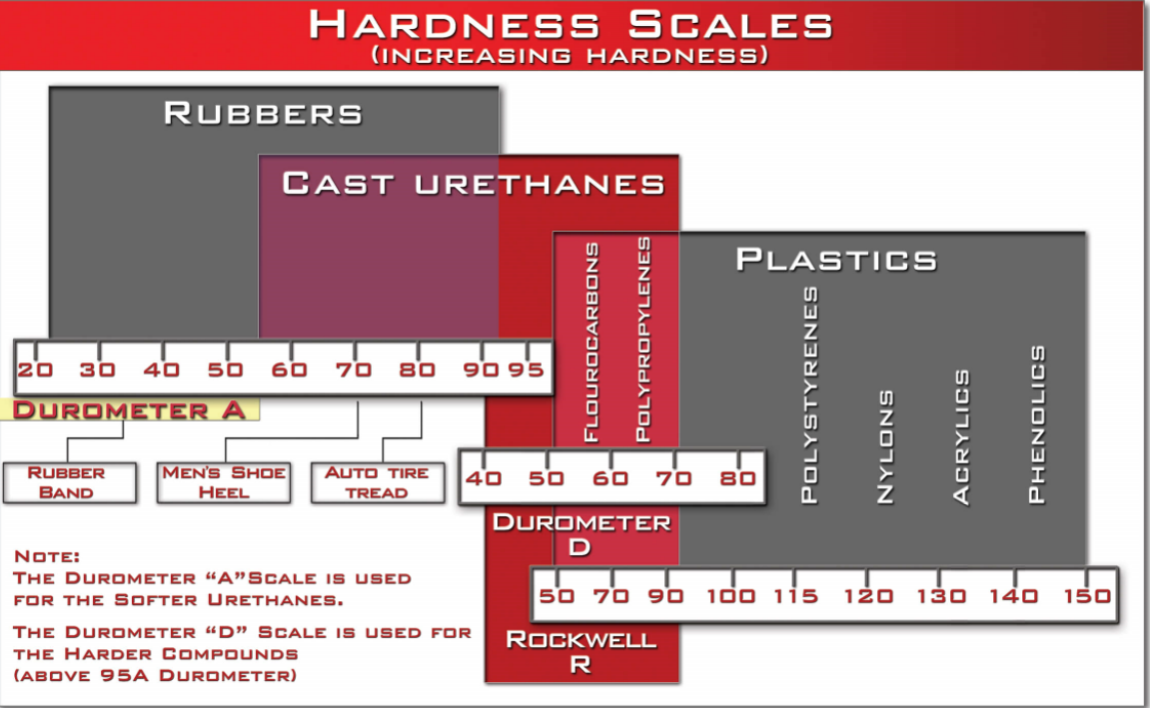Polyurethane Advantages & Properties
Polyurethane is an extremely versatile elastomer used in countless applications worldwide. Polyurethane's mechanical properties can be isolated and manipulated through creative chemistry which creates a number of unique opportunities to solve problems with performance characteristics unequaled in any other material. Our understanding of how to seize these opportunities allows Precision Urethane to provide “Flexible Solutions Through Polymeric Innovation.”
Wide Range of Hardness
The classification of hardness for polyurethane relies on the prepolymer's molecular structure and can be manufactured from 20 SHORE A to 85 SHORE D
High Load Bearing Capacity
Polyurethane has a high load capacity in both tension and compression. Polyurethane may undergo a change in shape under a heavy load, but will return to its original shape once the load is removed with little compression set in the material when designed properly for a given application.
Flexibility
Polyurethanes perform very well when used in high flex fatigue applications. Flexural properties can be isolated allowing for very good elongation and recovery properties.
Abrasion & Impact Resistance
For applications where severe wear prove challenging, polyurethanes are an ideal solution even at low temperatures.
Tear Resistance
Polyurethanes possess high tear resistance along with high tensile properties.
Resistance to Water, Oil & Grease
Polyurethane's material properties will remain stable (with minimal swelling) in water, oil and grease. Polyether compounds have the potential to last many years in subsea applications.
Electrical Properties
Polyurethanes exhibit good electrical insulating properties.
Wide Resiliency Range
Resilience is generally a function of hardness. For shock-absorbing elastomer applications, low rebound compounds are usually used (i.e. resilience range of 10-40%). For high frequency vibrations or where quick recovery is required, compounds in the 40-65% resilience are used. In general, toughness is enhanced by high resilience.
Strong Bonding Properties
Polyurethane bonds to a wide range of materials during the manufacturing process. These materials include other plastics, metals and wood. This property makes polyurethane an ideal material for wheels, rollers and inserts.
Performance in Harsh Environments
Polyurethane is very resistant to extreme temperature, meaning harsh environmental conditions and many chemicals rarely cause material degradation.
Mold, Mildew & Fungus Resistance
Most polyether based polyurethanes do not support fungal, mold and mildew growth and are therefore highly suitable for tropical environments. Special additives can also be added to reduce this in polyester materials as well.
Color Ranges
Varying color pigments can be added to polyurethane in the manufacturing process. Ultraviolet shielding can be incorporated into the pigment to provide better color stability in outdoor applications.
Economical Manufacturing Process
Polyurethane is often used to manufacture one-off parts, prototypes or high volume, repeat production runs. Size ranges vary from a couple grams to 2000lb parts.
Short Production Lead Times
Compared to conventional thermoplastic materials polyurethane has a relatively short lead time with significantly more economical tooling costs.
Advantages of Polyurethane When Compared to Conventional Materials
| vs. Rubber | vs. Metal | vs. Plastic |
|---|---|---|
| High abrasion resistance | Lightweight | High impact resistance |
| High cut & tear resistance | Noise reduction | Elastic memory |
| Superior load bearing | Abrasion resistance | Abrasion resistance |
| Thick section molding | Less expensive fabrication | Noise reduction |
| Colorability | Corrosion resistance | Variable coefficient of friction |
| Oil resistance | Resilience | Resilience |
| Ozone resistance | Impact resistance | Thick section molding |
| Radiation resistance | Flexibility | Lower cost tooling |
| Broader hardness range | Easily moldable | Low temperature resistance |
| Castable nature | Non-conductive | Cold flow resistance |
| Low pressure tooling | Non-sparking | Radiation resistance |
Find more urethane technical data including hardness, abrasion resistance, physical properties and more.


